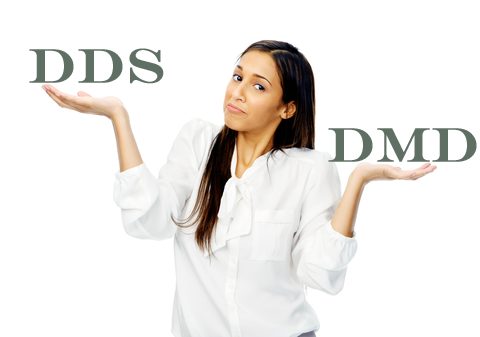Have you ever wondered what the three letters that follow your dentist’s name stand for? If your dentist is a DMD, then he or she is a Doctor of Dental Medicine. A DMD is an academic degree awarded to students upon completion of their dental training program. Many universities offer a 4-year pre-doctoral program, which combines an academic education with clinical training to prepare students for the exciting field of dentistry.
The DMD program offers students an intensive but rewarding experience. Many of today’s DMD students receive their clinical training in state-of-the-art facilities that simulate real dental operatories and practice their skills on live patients in their schools’ dental clinics. An education in the basic sciences and research projects are also an important part of the DMD program. All DMD students are required to take the National Board Dental Examinations and test for state licensure in order to practice.
DMD vs. DDS
- There is no difference, according to the ADA
- Both receive similar training at dental school
- Both are qualified to practice general dentistry
Dentistry 101
A DMD is a general dentist who is trained to perform many types of preventive, restorative and cosmetic dental procedures. For dental treatments that are beyond your dentist’s expertise, you may be referred to a dental specialist. Your DMD’s practice may include, but is not limited to, the following dental services:
Preventive Dentistry
- Dental Checkups and Exams
- Ultrasonic Cleaning
- Oral Cancer Screening
- X-rays
Restorative Dentistry
- Tooth Filling (Amalgam and Composite Fillings)
- Dental Inlays and Onlays
- Dental Crown
- Dental Bridge
- Dentures (Full and Partial)
- Dental Implants
- Gum Disease Treatments
- Endodontic Treatment (Root Canal Therapy)
- Oral Surgery (Tooth Extraction)
Cosmetic Dentistry
- Teeth Whitening
- Dental Bonding
- Enamel Shaping
- Veneers
DMDs have several career options available to them. While many DMDs go into private practice, some choose to spend a year in residency at a hospital. Others may return to school to pursue a post-doctoral degree, preparing them to enter the fields of dental specialties, academics or research.
What’s in a Name?
What’s the difference between a DMD and a DDS? DMD stands for Doctor of Dental Medicine, whereas DDS stands for Doctor of Dental Surgery. Both programs are designed to prepare general dentists for licensure and according to the American Dental Association, they’re the same. However, the ADA recognizes the confusion some patients may have over the difference between the two degrees, and there has been great debate over whether dental schools should adhere to one name.
The basis of the DMD versus DDS debate actually has its roots in ancient medicine. The practice of medicine was once divided into two groups: those who treated injuries using surgery and those who healed diseases using medicine. Dentists often fell into the first group. The first American dental schools were independent of universities and functioned more like trade schools, awarding their graduates with a DDS degree to perform clinical procedures. Dentistry has come a long way since then. Today’s dentists are respected members of the medical community, capable of diagnosing and treating diseases, performing surgical procedures and educating the public about dental health.
In 1867, Harvard University, whose degrees are granted in Latin, took issue with the phrase “Doctor of Dental Surgery.” Feeling the Latin translation, Chirurgae Dentium Doctoris (CDD), wasn’t appropriate, Harvard leaders decided to name their dental degree program DMD, or Dentariae Medicinae Doctor. Over the past century, several universities have switched the name of their dental program to Doctor of Dental Medicine because it better reflects dentistry as a whole. Regardless, dentists who receive a DMD degree virtually receive the same education as those who earn a DDS degree, and one type of degree is not better that the other.
The Final Verdict
Are you interested in becoming a dentist? Now is a great time to pursue a career in dentistry. Dentistry is a highly respected and rewarding field, with dentists falling in the top 8 percent of U.S. earners. Today’s dentists are scientists, doctors, educators and artists, and many serve as leaders in their communities. With more dentists entering retirement age and a lack of dental care in rural areas, the need for dentists is stronger than ever.

